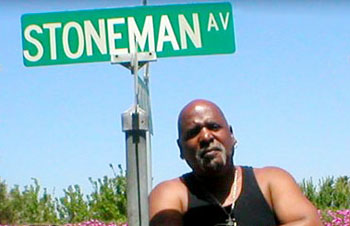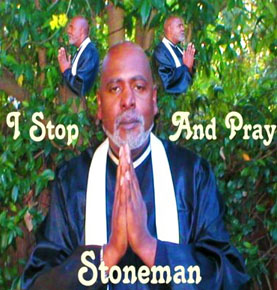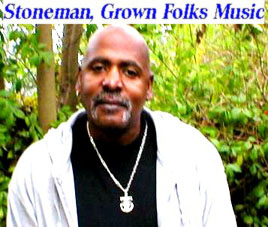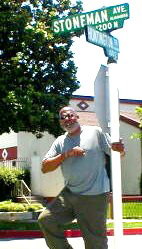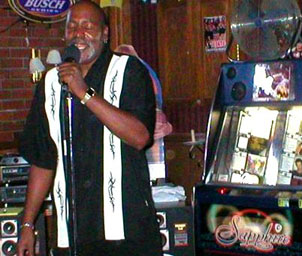| From
gang member to indie songwriter: |
||||||||||||||
|
|
For a number of years, this songwriter-musician has been making his mark in the field of Black Gospel music. His early youth, however, had been a gritty rumblefish existence with no reason to look forward to any kind of tomorrow --until his future and destiny were changed through a remarkable series of events. Little did he know that his gang name would one day come to represent a new positive outlook and faith in himself, others and God. The Empress is proud to bring you this feature interview with the soft-hearted songwriter known as "Stoneman".
Q: The first question has to be: Was Stoneman Avenue named after you, or were you nicknamed after the street? Stoneman: Actually, neither is the case. My birth name is Stonewall. People started calling me Stoneman when I was in my early teens. Growing up in South Central Los Angeles, everyone had street names. I was being initiated into a street gang and had to fight a big guy they called Caveman. He was so much bigger than me and gave me a thorough thrashing, but I would not go down to the ground no matter how many times or how hard he hit me. Finally they stopped the fight, and the leader of the gang said I was like a "man of stone" because I had stayed on my feet. For a while they all called me "man of stone", and later it was shortened to Stoneman. Q: What did being a member of early 'posse' gangs in LA such as the 'Brims', and having run-ins with rival gangs and the law, teach you about street life? Stoneman: Well, I was an abused and abandoned child. Often I would run away from my abusive legal guardian and wind up living in the streets trying to survive on my own. One of the gang leaders found me near death in an alley one day and took me to the hospital. I had double pneumonia and my lungs had collapsed. But, I survived. The gang leader told me then if I ever ran away again that I could sleep in his garage away from the wintry cold of the streets. So he and the members of the gang became sort of an extended family. Q: What kind of mentality did this instill in you? Stoneman: Being involved in a gang gives you what I like to call a "wolf pack" mentality. There was a constant need to protect our pack’s turf and maintain a ruthless reputation so that other gangs would stay away. It was every man for the gang. I was willing to kill or die for and/or with the crew. Q: Did you really think it was a great life, or deep down did you know something was missing or wrong? Stoneman: I was used to taking violence and they taught me how to give it back. Plus, having friends that were supposedly willing to die for me made me feel important. The courts and social systems had all failed me. They had left me in the care of one of the most violent and insane people I have ever known. But they didn't follow-up or anything like that. So running away got me involved in the gangs, and the mentality behind the gangs was taught to me by someone who had actually saved my life when I was very young. You see my older brother was all that I really had who was "real family". But he had been so violently abused by our legal guardian that he went to Juvenile hall in Los Angeles, turned himself in, and refused to come back. So, without him there in my life I turned to another guy who was older and volunteered to help. It just so happens that he was also a leader in the gang. A few years later he was killed in a drive-by shooting at a house party. But at the time I thought being in the gang was a great life. After all, for once in my life I had power to retaliate as violently as I thought was deserved. Plus I was taught street survival skills like stealing, drug dealing and even robbery. However, after being elevated to leader status in the gang, I found myself wishing I didn't have to do all those things. The higher up I went, the more crazy I had to act in order to control the crew. Also, there was always someone trying to challenge me so that they could take over. It was a lose/lose situation all the way around. I didn't know what was missing from my life -- I just knew that there had to be something better. Q: What situation in your life exactly made you decide to join the military? Stoneman: I didn't really just decide to join the military. I was coaxed into it by a judge. You see, there was a new gang in town and they were taking over all the other gangs by assassinating their leaders. This gang had reached about 10,000 strong, with my set only about 500 strong, and we were the only gang left standing in their path. So, I was targeted for assassination. Everywhere I went I was shot at. So I started carrying a gun everywhere I went. Problem was that Los Angeles had a curfew for anyone under 18 years of age. The police kept stopping me for curfew violation and would find me carrying guns as well. After my 6th stop for carrying a concealed weapon the judge became fed up with me. He gave me the choice to either go to the Preston School For Boys (boys prison) or into the military. His logic was that I seemed to like to carry guns, and Uncle Sam was looking for a few men who liked to carry guns. So, rather than go to prison I went into the military. Q: Did you expect to meet God there, or was He introduced to you there - as you've described, "by the Host of Heaven." Stoneman: I don't like to talk about the war much because it was a very scary and confusing time for me. While I was there I saw miraculous things that made me begin to wonder about God. There were a lot of folks there that prayed daily and sometimes I would join them. I wasn't even a Christian. I was raised in the Buddhist faith. But I became a "just in case" Christian. I was kind of like the thief that was hanging on a cross next to Jesus. I thought just in case their God works, I’ll give it a shot. The miracles I saw during this time pertains to what I termed the "Host Of Heaven". I witnessed some people being spared early death in ways that were nothing short of miraculous. This made me very "Christian Curious".
Q: As you've stated in your MySpace profile, you returned home after your army stint "4 years later and began my aspirations in music. Taught myself how to play instruments and how to sing. Over the years I have played in a bunch of bands in a variety of genre's including Jazz, Reggae, Funk, Rock, Metal, Gospel, Soul, Ska, Hip-Hop and of course R&B. I started Tower Of Stone Publishing/ASCAP in 1992 and "One Man Band Productions" in 1994. All in all I have written and produced over 400 songs in 12 musical genres. Now? Well now I am producing some young folks and heading up my own label "Hands Up Records". I have had 23 songs signed to publishing deals and have released two solo CD's. The "Stoneman Avenue CD" (R&B/Hip-Hop) was released in May of 2006. My latest solo CD "I Stop And Pray" (Gospel) was released in March of 2007. I also plan to release 2 CDs by my artists in 2007. I graduated with a Recording Arts/Commercial Music Certificate in June of 2006. " This is an incredible achievement for someone who came from the streets. To what or whom do you credit for motivating your life toward such musical accomplishment and for now being a positive mentor to others in the field of Christian music? Stoneman: There was a minister name Pastor Louis Yarbrough who first lead me into the prayer of salvation. He was an old Baptist minister with a spiritual connection to God like none I have ever seen before or since. I didn’t have access to any instruments so he gave me the key to the church and told me I could go in and practice whenever I felt the need to. So, I assumed he wanted me to learn how to play for the choir. So I started teaching myself old hymns and spirituals thinking this would please him. One day he walked into the church and heard me playing one of those hymns. He sternly asked me what on earth I was doing playing that hymn. I explained that I was doing what I thought he expected me to do. Then he told me that he had given me a key to come into the church and work on MY music. He said "God has given you a gift that will bless many people." He told me to reach down inside myself and find that untapped ability that God has stored within me. I argued that my music was not traditional gospel music at all and I didn’t think church people would like it. Then he said, "The music God has given you is not for the church folk, its for the folk that need to go to church. It’s a different sound that many will be blessed by." Then he asked me if I wanted the approval of the church folks or the approval of God. He is the one person that believed in my music long before I ever won any awards or even knew how to play. He encouraged me to go against the grain. He gave me the approval to explore, experiment, grow and diversify. He didn’t live long enough to actually see some of the things my music has done but there is no doubt in my mind that he knows. He is the only man that I’ve ever felt close enough to call "dad". Q: How and why do you continue to move forward in your musical journey, and do you feel there are still doors to open? Stoneman: Music has always been one of the few things that I do really well. After I accepted Jesus as my personal Saviour it seems that my abilities to write, produce and perform were amplified. I became and continue to be a man possessed by the sheer magic of music. I love to see the joy that it brings to others. Each song is like a new born child for me. I start shaping and moulding it from the first beat to the last bar. It's like I have a radio in my head and it keeps playing the music that I write and produce. There are many stations on that radio with many genres. I actually write and produce about 12 genres. But Gospel and Contemporary Christian music has a special place in my heart. That is because that music is used as a tool to bring unbelievers to Christ and to praise God. But there is so much more I want to do with my music. I have written some musical stage plays that I would like to see in production someday. Also, I actively mentor to young artists who need help in paving their own directions musically. My love for God, people and the art keeps me going forward from song to song and project to project.
Q: You also state that "I have my own studio where I write and perform all the music and vocals on my recordings. I am self-contained because I play all the instrumentation and sing 4 octaves. Also, I have won several International Songwriting Contests and am currently the reigning 1st place winner (Reggae category) in the Unisong International Songwriting Contest (see www.unisong.com for posted results). My song "Danger!!" won first place out of thousands of song entries from all over the world." In that respect, how prolific are you as a songwriter in terms of a backlog of material? Stoneman: Well, currently I have over 400 songs in twelve genres in my catalogue. I write about 5 songs a week and throw 4 of them away because they don’t make the "cut". That basically means I didn’t think they were good enough for others to hear. Q: Where do you feel your greatest inspirations come from? Stoneman: My life itself has been a wealth of material for songwriting. "Danger" is a true story about a racial profiling incident I had with the police a few years back. I think the song won 1st place because the judges could identify with the story presented in the song. My greatest inspiration comes from everyday life experiences. For instances "Flag Draped Coffins" came from seeing caskets flown in from Iraq. It inspired me to write a song of honor for the troops. "Findlove.com" was written after I found my soul mate on a online dating service. We have been together for 7 years now. Oh and "Freaks Of A Feather" came from a conversation I was having with my sweetie about two friends of ours. During the conversation she bluntly said "Freaks Of A Feather Freak Together" and immediately a light went on in my head. About 4 hours later I had written and produced a new song. That song won a top 25 award in the Hip-Hop category out of thousands of entries from all over the world. "In Paradise" which is on my current gospel CD came from a dream I had where I was in heaven with God. So, I would have to say that my biggest tool for writing is to pay attention to life in general. Anything that affects me emotionally, spiritually, morally or humorously could be material for a new song. Q: Do you have any specific ritual as a songwriter, or are you a blank canvas and "receive" creative gifts from a Diva Muse? Stoneman: Hahahaha, Diva Muse? Ok, I’’ll have to look that up later. No, I don’t have a ritual. I just carry a pocket recorder with me everywhere I go. When I get an idea, I record it. Also, I am always hearing music in my head. So, when I hear something that really gets me going I stop and hum it into the recorder. Other than that, I just simply sit down in my studio and start working. If an idea really catches on, I will often work for as long as 18 hours on it until I feel it is right. I am music’s slave. When I feel the call to work, I cannot stop until the song is completely done. It is only then that I can actually sleep soundly. Q: What are your most important reasons for participating in songwriting contests? Stoneman: I participate in songwriting contests so I can get a gauge on how well my writing is going. They are usually judged by accomplished artists and producers who have proven track records in regard to successful songs. By participating in contests I get a chance to see how my songs stack up against other songs from all over the world. Also, the prizes are pretty cool, too! Q: Has being a street gang member in the past given you special insights into the social and spiritual conditions of gangsters today? You've shared that, "... I have a pastoral certificate and worked as a prison chaplain for eight years here in Cali. I brought the word of God to inmates in 36 prisons, Juvenile Halls and Youth Authority camps each year. Because of my past street affiliations I was very effective in reaching the hard cases amongst the bangers on all sides. They respected me because of my past street credentials. I even had several heartfelt reunions with past enemies/associates who are on death row. Forgiveness and the love of God was and is my way of life." Stoneman: Yes, I believe that my past is the reason why I was handpicked by God to become a prison chaplain. The one thing you must be able to do in order to minister to anybody is to have the ability to empathize with their individual and collective situations. Because I had so many friends that were locked up in prison, going to prison to minister is like a weird sort of homecoming. When I first started, the word got out to prisons all over California. So much so that there were many who came to church service who normally wouldn't come. Some just had to see if I had really been changed and others wanted to test me to see if I had become some weak Christian. Then, there are those, that no matter what you do, will always look at you as part of the set. Whatever the case, they came -- and each time I hit them over the head with the gospel of Jesus Christ. What I mean by hit them over the head is that I broke it down to them in street terms. I interpreted the scriptures in street language that they all understood. Because of this I established a kinship with the inmates as one of their own and became an example of the results of hope and faith. After all, if Stoneman could make it, anyone could make it. Q: Does any one reformed gang member that you've ministered to stand out for you as an example that there is always hope to change direction in life for the better? Stoneman: There are many former gang members that have reformed and gone back to society to live productive lives. Most I lose contact with as time goes by. Most had street names like Banga, Death Stalker, Oh, and my old friend Caveman. They all work, have families and pay taxes like the rest of us now. Almost all of the ex-offenders that get plugged into a local church never go back to prison. Also, there are thousands of people that I ministered to in juvenile halls and youth authority camps that have grown up to become productive adults. Every blue moon I run into someone who walks up and gives me a hug while telling thanks for coming out and ministering in the place they were incarcerated. They are all very special to me even though I don’t remember them all.
Q: You've set goals to "be a catalyst for change in the hood and in this nation," and to "change the negative human conditions that many people face and to inspire others to seek ‘The Real’." In your eyes you've expressed that the short answer of what the "The Real" is all about is "positive spiritual energy derived from the infiltration of funky assed beats that collaborate with strong messages of love, respect and indisputable knowledge of self and the history of your people. It is James Brown singing "I'm Black and I'm Proud" or Gill Scott Heron declaring "It's Winter In America". It is the chronicles of street life delivered by modern day Griots with names like Naz, Common, Tupac and Notorious Big. "The Real" can be easily recognized when you hear yourself saying: "Yeah. That's real!" True, but everyone has a subjective view of what's "The Real" for them. Is what you offer them more real than what they think they already have or live out? Stoneman: Oh no, what’s "real" for one can be irrelevant to another. Even what’s funky for one may be bunk to another. What I am saying is that it is my goal to offer something new and positive. An alternative (if you will) to what is currently being pushed down consumers throats as music. Not everybody want to hear the "B" word, "N" word etc. every time they listen to music. Most times some of these artists are rapping or singing so fast that you can't even understand what they are saying or if you slow it down and really listen, it makes no sense at all. "The Real" is something that makes sense to the listener. It makes sense beat-wise, song form-wise and message-wise. It does not inflame, it empowers, inspires and educates. One thing for sure. What I offer musically is not for everybody. Some people don't like to hear Christian themes on non-traditional music formats. Others have different genre tastes from what I present. So "the real" that I provide is not better than any other music out there. Its just a different flavor amongst many flavors. Q: Being black and proud is of course an admirable message to encourage young black people to live in their full potentials, but what is it that you give them in terms of hope for tomorrow? Stoneman: I try to give them my personal life’s accomplishments as examples toward hope and faith. As I stated before. If I could overcome the obstacles of my past, others surely can. Also, by becoming followers of Jesus Christ we inherently embrace a world of brethren: Black, White, Asian, Latin or whatever. So being Black and proud is to achieve a sense of self worth. Being a Christian is to obtain a sense of spiritual kinship with all who believe in the Risen King. I believe that the only way hate can be conquered is through love. Q: What do you see down the road for tomorrow's black singers in Christian or other genre music? Stoneman: Well, the current landscape of Gospel music is as segregated as it was 30 years ago. It’s like there are two different gospel worlds: Black and White. I am hopeful that there will be strides made toward bridging those differences through collaboration and cross genre experimentation. Maybe then both Black and White gospel will be played on the same music stations. There is a world of opportunity out there for singers of all colors who are willing to take risks genre wise. Q: What would you like to see for yourself in the future for your music and message? Stoneman: Oh, just to continue to be a blessing to others. I get so many e-mails and messages from people all over the world that have been blessed in some special way by my music. That is the ultimate compliment for me. I so much want to be a positive inspiration for others. Of course, I would like to see my current CD be successful, and I have several projects in the works with other artists that I trust will also be successful. As well, I would like to do some film scoring and write hits for other artists. There’s so much I would like to do, but I will be happy with whatever God blesses me with. Q: Are there any other areas you feel you'd like to reach out in outside of music or ministry? Stoneman: Well, I am currently writing a book called "The Stoneman Blogs" It is a book of weekly blogs about my past. Each week I share a Blog from the book on my MySpace page. It has become a very popular blog and it seems that many people are inspired by the things I write. By sharing my testimonies in print I feel that I am reaching a whole new crowd that may not like my music but enjoy reading my blogs. I have written two books previously but have never tried to get them published. Maybe that will be another project for me at some point in the future.
http://www.myspace.com/duhstoneman
|
|||||||||||||
|
|
